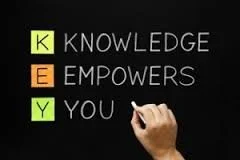
News You Can Use
Info for Your Use
Be Cyber Security Empowered
There are tons of articles out there about the scary cyber-attacks against organizations, individuals and even our children. Reading all this can be overwhelming, frightening and just plain debilitating. What can you do to protect yourself against nameless faceless intruders that enter your home via ones and zeros through your phone or cable line or wirelessly through your carrier? Makes you want to unplug and hide in the closet or just give up and paint a bulls eye on your chest.
But neither is necessary. There are things you can do to protect yourself. And they start with a little education. The time when the Internet was magic and just happened is no longer a safe time to live in. You now need some basic understanding in order to keep yourself safe. Think of it like a car. When you are young they just work. Maybe you pick up that the wheel does something and, for some, the horn and words your mom disapproves of seem really important.
But as you mature, you learn more about how it works- there are pedals to speed up and slow down, the key starts something called an engine that propels you down the road and the wipers help you see in the rain. Finally there is a time where you learn the subtle nuances like turn signals, yielding, and driving defensively to protect yourself.
Well online is going through that same kind of maturity and it's time for us all individually and organizationally to get to that mature level. Notice that with cars you never had to learn how to work on the engine to be safe in your car. Just the same, learning to be safe and protect yourself online doesn't mean you have to learn all the intricacies of how the Internet works. But you do need to learn the rules of the road and how to protect yourself when others are behaving badly.
Step 1 for an individual: How many of you when presented with a form to sign up online just give them whatever info they ask for? Even if some of the fields are clearly marked optional. First opt out of any data they don't force you to provide. Does the Dr.’s office really need to know your Mother’s maiden name? Why? What are they going to do with it? How are they going to protect it? If you don't ever give it to them, you don't have to be concerned. Why do you care? To open a credit card account you need a person’s name, birthdate, social security number, and mother’s maiden name. Crazy huh?
Step1 for organizations: don't collect data you don't have to have. Then you don't have to worry about protecting what you don't have.
See now that was simple wasn't it? No ones and zeros, no higher math involved or deep dive into the bowels of technology. Just simple rules of the road.
The rest isn't much harder; just learning to recognize things that don't seem quite right. Checking links before you open them the same way you look both ways before pulling out when the light first changed. Not necessarily because you don't trust other drivers but because it makes good sense to take that moment of precaution to protect yourself from what could be a horrendous tragedy.
The trick to all this is to empower yourself and your organization with a little knowledge of how to be out there safely.
My company leadership has been discussing this at length and we have made the decision to dedicate the direction of the firm to empower people, individually and organizationally. There are courses in our training program that are available to everyone. There are free webinars to help people understand what to do. All you have to do is learn a little and mature to the next level of Cyber Citizen.
Protecting Yourself In A Connected Age
Whether its news of a new corporate compromise, or a notice in the mail that your accounts have possibly been stolen, it is inescapable in this new Internet of Things world that protecting yourself isn’t what it used to be. It’s no longer enough to lock your car and home, shred your sensitive paperwork before putting it in the trash and hide your check book and credit cards from your friends and relatives. Now you are online, attached, connected, and Tweeted, Instagramed, and Facebooked around the world.
Children are online before they can even carry on a conversation and their tablets are as natural as crayons. Older Americans are connected so that they can stay involved with their younger family members in a way never before available.
But the downside is most users have a plethora of user names and passwords or other authenticators that are no longer manageable. They have multiple connected devices that contain their personal secrets and identifiers, but few know the first thing about how to secure those numerous accounts, software, apps, devices and computers.
Thinking Cyber Security is the problem of companies, ISPs, online services, or even your local store just leaves you vulnerable. Knowing how to provide your own personal Cyber Security is now as important a survival skill as knowing how to balance your checkbook (paper document that allows you to pay for things for my younger readers).
Cyber Security education needs to be a part of our education system, starting in Pre-Schools, through Elementary, Middle and High School, and offered in College self-improvement courses. It also needs to be part of our Senior Centers, library out-reach, and available through our other community resources.
Additionally, this education isn’t a learn-it-and-you-are-done affair. Just as the technology we use evolves so too do hacking avenues and possible vulnerabilities. Staying up to date on Cyber Security is going to be an essential requirement for personal protection and survival in our new connected age.


